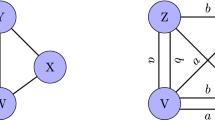Abstract
The optimization of stochastic linear problems, via scenario analysis, based on Benders decomposition requires appending feasibility and/or optimality cuts to the master problem until the iterative procedure reaches the optimal solution. The cuts are identified by solving the auxiliary submodels attached to the scenarios. In this work, we propose the algorithm named scenario Cluster Benders Decomposition (CBD) for dealing with the feasibility cut identification in the Benders method for solving large-scale two-stage stochastic linear problems. The scenario tree is decomposed into a set of scenario clusters and tighter feasibility cuts are obtained by solving the auxiliary submodel for each cluster instead of each individual scenario. Then, the scenario cluster based scheme allows to identify tighter feasibility cuts that yield feasible second stage decisions in reasonable computing time. Some computational experience is reported by using CPLEX as the solver of choice for the auxiliary LP submodels at each iteration of the algorithm CBD. The results that are reported show the favorable performance of the new approach over the traditional single scenario based Benders decomposition; it also outperforms the plain use of CPLEX for medium-large and large size instances.


Similar content being viewed by others
References
Benders J (1962) Partitioning procedures for solving mixed variables programming problems. Numer Math 4:238–252
Birge JR (1985) Decomposition and partitioning methods for multi-stage stochastic linear programs. Oper Res 33:989–1007
Birge JR, Louveaux F (1988) A multicut algorithm for two-stage stochastic linear programs. Eur J Oper Res 34:384–392
Birge JR, Louveaux F (1997) Introduction to stochastic programming. Springer, Berlin
Dantzig GB, Wolfe P (1960) The decomposition principle for linear programs. Oper Res 8:101–111
Escudero LF, Garín MA, Merino M, Pérez G (2007) A two-stage stochastic integer programming approach as a mixture of Branch-and-Fix Coordination and Benders Decomposition schemes. Ann Oper Res 152:395–420
Escudero LF, Garín MA, Merino M, Pérez G (2009) A general algorithm for solving two-stage stochastic mixed 0–1 first stage problems. Comput Oper Res 36:2590–2600
Escudero LF, Garín MA, Merino M, Pérez G (2010) An exact algorithm for solving large-scale two-stage stochastic mixed integer problems: Some theoretical and experimental aspects. Eur J Oper Res 204:105–116
IBM ILOG CPLEX v12.2 (2009). http://www.ilog.com/products/cplex
INFORMS. COIN-OR (2010) Computational INfrastructure for Operations Research. http://www.coin-or.org
Kall P, Wallace SW (1994) Stochastic programming. Wiley, Chichester
Lasdon L (1970) Optimization theory for large systems. Macmillan, New York
Pérez G, Garín MA (2010) On downloading and using COIN-OR for solving linear/integer optimization problems. Working paper series Biltoki. DT.2010.05. http://econpapers.repec.org/paper/ehubiltok/201005.htm. Basque Country University UPV/EHU, Bilbao, Spain
Rockafellar RT, Wets RJ-B (1991) Scenario and policy aggregation in optimisation under uncertainty. Math Oper Res 16:119–147
Van Slyke R, Wets RJ-B (1969) L-shaped linear programs with application to optimal control and stochastic programming. SIAM J Appl Math 17:638–663
Wets RJ-B (1966) Programming under uncertainty: the equivalent convex program. SIAM J Appl Math 14:89–105
Wets RJ-B (1974) Stochastic programs with fixed recourse: the equivalent Deterministic program. SIAM Rev 16:309–339
Acknowledgements
This research has been partially supported by the projects ECO2008-00777/ECON from the Ministry of Education and Science, PLANIN, MTM14087-C04-01 from the Ministry of Science and Innovation, Grupo de Investigación IT-347-10 from the Basque Government, and the project RIESGOS CM from the Comunidad de Madrid, Spain.
Author information
Authors and Affiliations
Corresponding author
Rights and permissions
About this article
Cite this article
Aranburu, L., Escudero, L.F., Garín, M.A. et al. A so-called Cluster Benders Decomposition approach for solving two-stage stochastic linear problems. TOP 20, 279–295 (2012). https://doi.org/10.1007/s11750-011-0242-4
Received:
Accepted:
Published:
Issue Date:
DOI: https://doi.org/10.1007/s11750-011-0242-4
Keywords
- Benders decomposition
- Two-stage stochastic linear problems
- Scenario cluster auxiliary submodels
- Tight feasibility cuts




